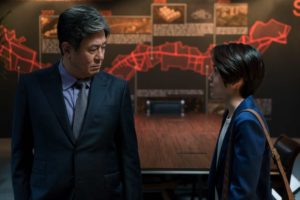Available for easy international viewing on Netflix, “The Mayor” is yet another film that dramatizes electoral corruption from a South Korean perspective. South Korea produces countless movies and dramas depicting corrupt politicians (someday I promise to write an article exploring why), which means “The Mayor” competes in a rather crowded space. With veteran actor Choi Min-sik (“Oldboy”) as its lead, the film certainly signals lofty ambitions. Yet, as in politics, ambition does not necessarily translate into results.
Choi plays Byeon Jong-gu, an incumbent two-term Mayor of Seoul who rose from humble beginnings as a factory worker. With long-term ambitions for South Korea’s presidency, Byeon wants to win an unprecedented third Mayoral term in order to create a stronger springboard towards the presidency. At a political rally, Byeon sees talent in a young advertising specialist named Park Kyung (Shim Eun-kyung) and asks his staff to recruit her for his campaign. Overflowing with ambition, Park accepts — and soon finds herself party to dark machinations in the service of Byeon’s limitless, amoral ambition.

While such initial descriptions of Byeon and Park make them sound like interesting characters, they aren’t — the two are one-dimensional and underdeveloped. Yes, Choi Min-sik plays a very convincing Mayor, with stump speeches on par with any real-life political powerhouse. However, there isn’t anything more to Byeon’s character, nor Park’s, besides a surface level notion of ambition. We have absolutely no idea what drives the two, and only see a few fleeting moments when they truly struggle with the weight of their unlimited desires.
Compare that to Frank Underwood and Zoe Barnes — as an analogous pair of seasoned politico and upstart female confidant — from the Netflix political drama “House of Cards”. In “House of Cards”, we see how a desire to be remembered, to leave a legacy, motivates Underwood’s ruthlessness. We become intimately acquainted with his philosophy on power, and explore the breaking points of that philosophy. Though serving Underwood’s interests, Zoe Barnes’ has her own agenda too, and we can understand how her initial marginalization as a junior reporter motivates her desire to get in bed with power.
“The Mayor” has no such depth. We have no idea what Byeon’s take on power is, why he feels the need to wiretap, bribe, and even murder to obtain a third term and ultimately the presidency. What does the Presidency even mean for him, anyways? Park’s character construction is even worse. Besides a cursory implication about how she no longer wants to work on trashy mouthwash commercials, we have absolutely no idea why she’d go from a regular desk job to doing a politician’s dirty work. When she starts questioning her complicity in Byeon’s schemes, it feels hollow, for we have no idea what she has personally lost or gained by virtue of partaking in them.
As far as the tropes of South Korean political dramas go, “The Mayor” only offers limited new material. It throws out a bit of fresh meat by showing how the latest in social media tactics and digital surveillance become vital tools for political skullduggery, but any equivalent movie in 2017 could’ve done that. It’s also the first Korean movie or drama I know that depicts the “Lee Myung-bak formula” of going from Seoul Mayor to South Korean president — but again, it was probably a just matter of time before some movie simply drew inspiration from that real life example. Other than that, “The Mayor’s” plot devices — prosecutors who become elected officials, ties between politicians and gangsters, bribery — are old tricks for anyone who’s seen other Korean political dramas.
Despite its flaws, I will admit that “The Mayor” does have some entertainment value, though again only at a surface level. Thus, it’s not completely surprising the film topped South Korea’s box office upon its release, because let’s face it: most people pay to be entertained, not enlightened. There was probably also an element of luck that contributed to its commercial success. Thanks to real-life political corruption, i.e. the impeachment of Park Geun-hye, “The Mayor’s” April 26, 2017 release came two weeks before South Korea’s May 9 presidential election — during which audiences were already in a political mindset.
The Mayor (Korean: 특별시민) — South Korea. Dialog in Korean. Directed by Park In-je. Running time 2hr 10min. Starring Choi Min-sik, Kwak Do-won, and Shim Eun-kyung.